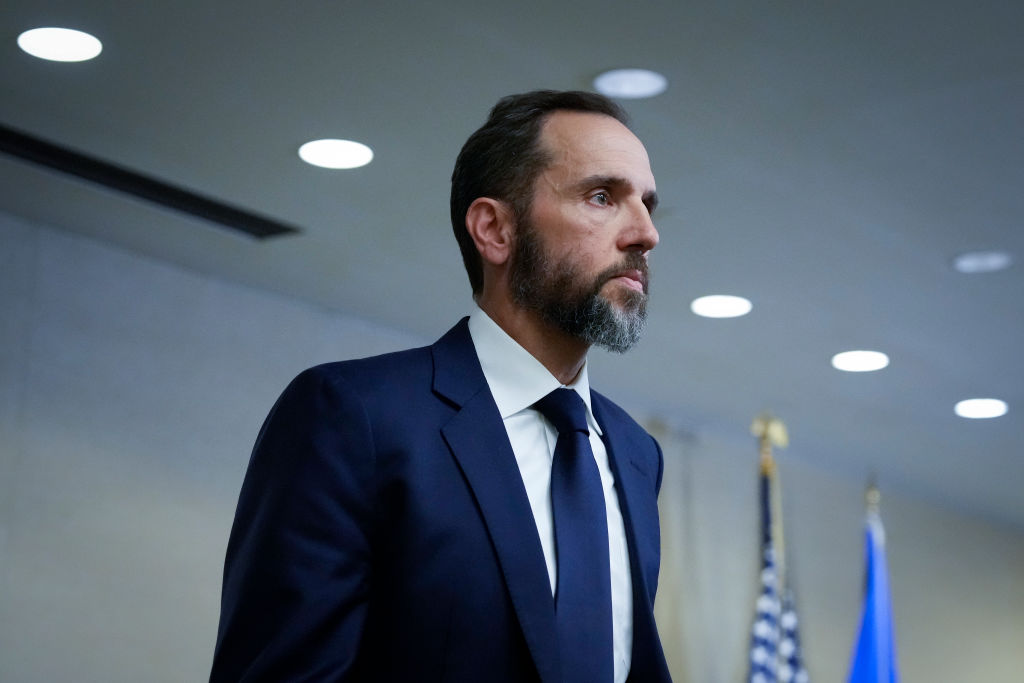Trump’s Lawyers Call Jack Smith ‘The Grinch’ for Making Them Work During the Holidays as Special Counsel Fights for His Cases’ Survival
A legal brief cites Dr. Seuss as the 45th president and the special counsel play litigation hardball.

Every day that President Trump’s criminal case is suspended pending appeal, he gets closer to a potential return to the White House that could allow him to disarm his pursuers once and for all.
That remorseless race against the clock is likely top of mind for Special Counsel Jack Smith, who is seeking to convict the 45th president. Judge Tanya Chutkan’s decision to stay the case pending an appeal on the question of presidential immunity, depending on how long it stretches for, could be an extinction-level event for the case, which now touches district, circuit, and Supreme Court dockets.
The stay comes at an inflection point in the case, which is scheduled to begin on March 4. Judge Chutkan ruled that Mr. Trump is not entitled to absolute immunity for acts he committed while he was president. She concurs with Mr. Smith that such protection is only in order for “official” acts, not efforts to ensure a second term as president. Mr. Trump has filed notice that he plans to appeal that ruling to the District of Columbia Circuit.
Mr. Smith, though, hoping to steal a march on the 45th president, asked the Supreme Court for an expedited appeal, short-circuiting the normally plodding path from trial court to the Nine. The special counsel allowed that such intervention would be “extraordinary,” but the justices agreed to consider the matter on an expedited basis via a process called “certiorari before judgment.”

Even as Mr. Smith turns to the high court, he is also working the circuit one, requesting that Mr. Trump’s appeal be considered expeditiously there as well. Mr. Trump, though, opposes this “rushed schedule” and argues that the “manifest public interest lies in the court’s careful and deliberate consideration of these momentous issues.” The circuit riders have sided with Mr. Smith.
Unavailing was Mr. Trump’s argument that the requirements of an expedited schedule “would make President Trump’s opening brief due the day after Christmas” and “require attorneys and support staff to work round-the-clock through the holidays, inevitably disrupting family and travel plans.” The brief is due on December 23.
The circuit riders, who have consistently sided with Mr. Trump’s foes, were unmoved by Mr. Trump’s argument, quoting a legal sage by the name of Dr. Seuss, that it is as if Mr. Smith “growled, with his Grinch fingers nervously drumming, ‘I must find some way to keep Christmas from coming. … But how?’”
Adding to the 45th president’s legal lump of coal is Judge Chutkan’s ruling that while Mr. Trump’s filing of an appeal is a moment of “jurisdictional significance,” it does not suspend the gag order that she put in place and that was this week affirmed by the D.C. Circuit. That is because the order “does not advance the case towards trial or impose burdens of litigation” Mr. Trump beyond those he already bears.
Even Mr. Smith, Judge Chutkan reports, assents that Mr. Trump’s appeal “automatically stays any further proceedings that would move this case towards trial or impose additional burdens of litigation on” the 45th president. Judge Chutkan, though, takes care to note that her jurisdiction is “not permanently vacated,” just “held in abeyance.”
That means, the judge adds, “that if jurisdiction is returned to this court, it will — consistent with its duty to ensure both a speedy trial and fairness for all parties —consider at that time whether to retain or continue the dates of any still-future deadlines and proceedings.” Those include, above all else, that start date of March 4, to which she and the special counsel are clinging.
While Judge Chutkan insists that her gag order is a “critical safeguard,” without which Mr. Trump “could irreparably harm any future proceedings and their participants,” she also recognizes that if Mr. Trump asks the D.C. Circuit to “take temporary jurisdiction over the enforcement of those measures, and that court agrees to do so, this court of course will be bound by that decision.”

